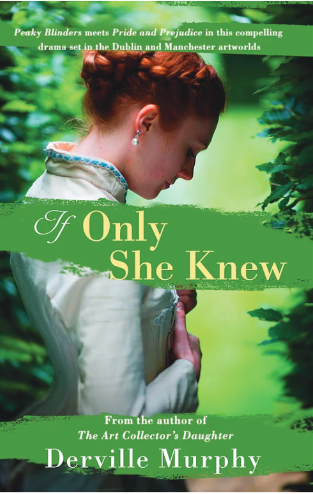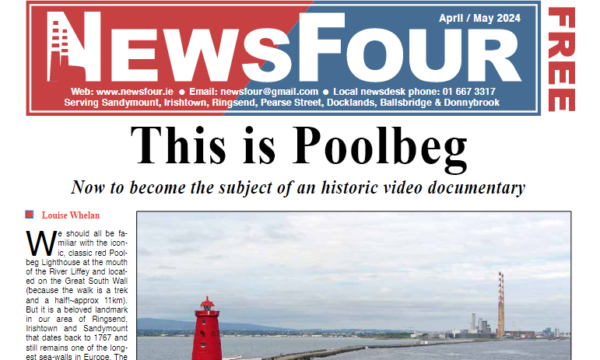
Geneva Pattison
Local author Derville Murphy’s new book, If Only She Knew, has been described as “Peaky Blinders meets Pride and Prejudice” and that is really an apt description indeed. Published by Poolbeg Press, this exciting historical fiction book will raise your pulse at certain plot points, while descriptions of well known Dublin areas and the wider counties bring a comforting sense of familiarity to the tale. However, this sense of ease is only fleeting in this particular tale.
The year is 1872 and we find the protagonist of the novel, Julia, at a crossroads in her life. Her father has just passed away and as the eldest daughter of the family, she expects that she will inherit well and take the reins of the family photography business. However, as ever in life, this is not the case. The shock of finding out that her younger sister has become the main inheritor of her father’s will sends Julia’s mind racing. As a woman in her mid 30’s, she has been overlooked by her father as a prospective future wife for a man. In one sense, this suits the free spirited artist Julia. She cannot think of a worse scenario to be in, to be under the control of another man. Her younger sister Harriet is set to marry the dry, penny-pincher Edward, which ultimately leaves Julia dependent and trapped under brother-in-law Edward’s thumb by circumstance.
Her strong will and inquiring mind is certainly reminiscent of Jane Austen’s heroine Elizabeth Bennet. However, somewhat unlike Elizabeth, Julia is more aware of society’s wider issues during this time and the plight of her countrymen. Enter the notably wild and suitably romantic Donal O’Keefe. As a woman from a traditional Unionist upbringing, her interest in the Fenian causes great distress to her family and likewise, to Donal’s more serious solicitor brother Eoin. This unlikely love affair is set against the backdrop of the Irish fight for Home Rule in the late 1800’s. The book gives wonderful historical context to this through various means, especially using letters between the two sisters upon Harriet’s move to Manchester with Edward. One letter from Harriet highlights the suffering of the Irish people and the poor in Manchester, mentioning struggling farmers, lay-offs and “starving men on every corner.” Observing these real world struggles makes Harriet more sympathetic to Julia and Donal’s wish for home rule, “the further I am from home, the more I am inclined to be sympathetic to the Irish cause.” She even mentions how impressive “the handsome young home rule supporter,” Charles Stewart Parnell is. Another wonderful historical location mentioned in the book, still available to visit and to purchase from today, is Sweny’s Chemist. Their famous lemon soap will span the ages and outlive us all!
The story is set during dangerous and tumultuous times for all involved. Secrets permeate the Benson family and the paranoia deepens as the story progresses. Julia receives a visit from a mysterious stranger, telling of Donal’s grave current situation in relation to his involvement with the Irish fight for freedom. He has gone missing in Manchester. At the same time, she makes a disturbing discovery about her brother-in-law’s controlling nature, which warrants the truth. Driven by a need for answers and a desire to discover what happened to Donal, Julia finds herself having to uproot herself from the city of Dublin and everything she has ever known, to start a new and quite terrifying, life-altering journey. Ultimately, to her dismay, she ends up with more than she bargained for.
Tales of espionage, bombs and very real historical violence pepper this quite tragic and complex ‘Romeo and Juliet’ love story. However, as I’m mentioning one work by Shakespeare, it has to be acknowledged that there is a definite sense of a darker version of “As You Like It” in certain parts of the novel. Buy the book and see what salacious dealings I’m talking about! Each character is delicately written, with their personalities leaping from the page in sections. An excellent feature in the novel is the separation of some of the characters’ perspectives into dedicated chapters. It gives us an in-depth sense of the person on the page and allows us to track their development, while reflecting on the different impressions they leave with other characters’ voices in chapters. You will be thoroughly surprised with some of the character revelations by the end of the book.
At times, it’s as if you’re a ghost observing these tense affairs. A thin page is all that separates you from the harsh realities that our ancestors lived through. We are a silent third party bearing witness to the every day and the unspoken moments of Victorian life in Ireland and the Irish in Britain, strange times of change for all. The main character Julia, is such a refreshing read. Her strong minded bravery, sacrifice and surprising patience, in more ways than one, is a stark reminder to us of the important role women played in the movement towards Home Rule.
Although this story takes many unexpected turns as it develops, with a large part of the novel focussing on that of Ireland’s independence, the book’s ultimate ‘twist’ is that of a woman finding her own independence. We know that Ireland eventually got the hard fought for freedom it deserved, as did Julia after many hardships, heartbreak and lies. By the end of the book, while technically Irish freedom is not on the table just yet, the idea of a free ‘Éire’ and the newly free Julia, seem to spiritually merge for a moment, giving the reader a sense of hope and peace. As if it is an allusion, or her fate foreshadowing that of Ireland’s own future.
Author Derville Murphy’s knowledge and background in architecture, history and art shines through in this novel and if historical fiction is not your thing, this book will help change that!
If She Only Knew is available online to purchase from amazon, price €9.99 by visiting:
To find out more about Derville’s work, visit her website at:
https://www.dervillemurphyauthor.com/



